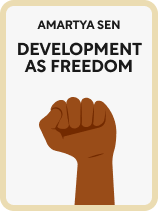

This article is an excerpt from the Shortform book guide to "Development as Freedom" by Amartya Sen. Shortform has the world's best summaries and analyses of books you should be reading.
Like this article? Sign up for a free trial here .
What’s Amartya Sen’s Development as Freedom about? What are the key messages to take away from the book?
In Development as Freedom, Amartya Sen argues that economic development goes beyond increasing wealth—it’s about expanding freedom. His book explores his reasoning, his definition of freedom and justice, and what it means to be poor.
Below is a brief overview of the key takeaways of Amartya Sen’s Development as Freedom.
Development as Freedom: Amartya Sen Redefines Poverty
In his book Development as Freedom, Amartya Sen takes a holistic view of poverty and characterizes it as impeding people’s ability to lead the lives they want.
Sen contends that income and wealth are only important as a means to something else, not for their own sake. As such, poverty is about more than low income; it’s about a lack of opportunity. Conversely, development is about more than simply increasing wealth; it’s about increasing opportunity.
Sen contends that poverty is harmful and unjust because it deprives people of the ability to lead the lives they want, and development is valuable because it allows people to improve their lives as they see fit.
Development as Freedom
Sen defines development as the process of expanding the freedoms that people can exercise. Sen gives two reasons why defining development as freedom is better than other definitions of economic development: freedom’s value and its efficacy.
Value of Freedom
According to Sen, wealth is merely an instrument for achieving the higher objective of attaining what we want: human flourishing and happiness. Freedom, on the other hand, is essential to achieving our objectives. In fact, enabling freedom is the purpose and value of economic development.
Efficacy of Freedom
Achieving progress individually and as a nation depends on people having the ability to make their own choices. Sen says that having free agency is the most effective way for people to attain the things they value, like happiness.
Explaining Freedom
Now that we’ve established Sen’s basis for redefining poverty, we’ll examine what specifically he means when he refers to development as “freedom.” Sen’s is a more expansive view of freedom than traditional definitions, including both negative rights (such as freedom from coercion) and positive rights (such as the rights to education and health care).
Sen argues that these freedoms are both the primary purpose of development, as well as the most effective means of development.
Five Types of Freedom
Sen cites five types of freedoms that advance a person’s potential, each of which reinforces the others:
- Democratic rights
- Commercial liberties
- Public provisions
- Ethical guardrails
- Safety nets
Sen’s Idea of Justice
Having redefined poverty and development, Sen turns to the idea of justice. Sen’s view of justice is part of his broader case for freedom-centered development because “just” (or equitable) opportunity is essential to increasing the five types of freedom discussed earlier.
Harvard philosopher John Rawls, whose ideas Sen echoes, argues that justice requires more than personal freedom. Similarly, Sen argues freedom requires more than just negative rights. Sen’s freedom also requires a set of positive rights in order to ensure that the disadvantaged have opportunities to develop their potential. His belief in positive rights compels him to include public provisions and safety nets among his five types of freedom.
(Shortform note: By “negative rights,” we mean the rights of a person to be free from external violations of liberty, such as coercion. By “positive rights,” we mean people’s claim to entitlements in order to secure a baseline level of welfare.)
The Role of the Market in Development
Sen identifies two reasons why free markets are integral to development:
- They are a means to economic growth and progress.
- They are a fundamental freedom that people have reason to value.
Sen acknowledges that free markets can increase economic growth and overall economic progress. However, Sen says free markets are much more important than just as a means to improve prosperity. Independent of its impact on economic growth, the freedom to exchange goods and services is a basic part of social interaction, and thus it’s valuable as its own kind of freedom.
Women and Development
Sen identifies bias against women as a major obstacle to growth in developing countries. This bias deprives women of basic rights in areas such as political participation and family planning. It also ignores the economic impact of women in the workforce. By empowering women, Sen argues, not only are women better off, but their communities become safer and more prosperous.
Preventing Famines
In addition to the problems resulting from disempowering women, famine can also be a problem in developing countries. Sen identifies three ways that freedom-centered development can prevent famines: private markets, free trade, and government support.
- Private markets provide incentives for people to produce and distribute food.
- Free trade allows people to convert their labor power into food.
- Government support enables famines to be avoided by offering supplemental assistance when there is a recession, natural disaster, or price shocks.
Sen also believes it’s not difficult or expensive for governments to prevent famines, and he says societies can guard against them through economic growth and famine relief (such as income transfers to buy food).
Sen contends that no famine has occurred in a functioning democracy because democracy provides an incentive for government officials to take the steps necessary to alleviate food shortages.

———End of Preview———
Like what you just read? Read the rest of the world's best book summary and analysis of Amartya Sen's "Development as Freedom" at Shortform .
Here's what you'll find in our full Development as Freedom summary :
- The five types of freedom that are integral to economic development
- How democracy can prevent famine
- How empowering women helps communities






